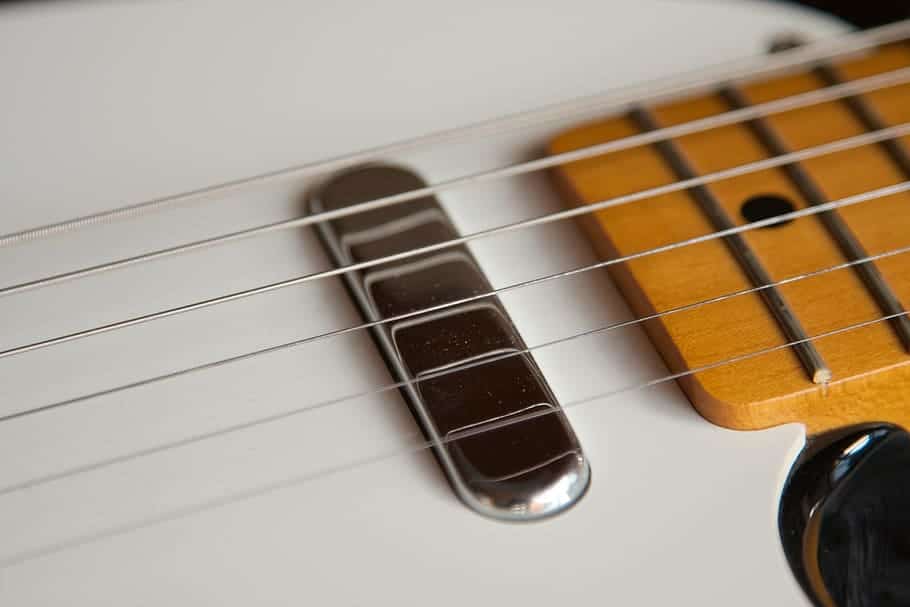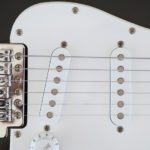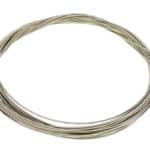Strings, like almost everything else on a guitar, have an impact on its tone.
Being that said, the hard part is now distinguishing what is their effect, and how big is it.
A short answer for this dilemma is the following:
Different string gauges have an impact on the overall tone of a guitar. Thinner strings have a more present mid-range and could cut better in the mix, while thicker strings have the opposite effect on mids. These tonal differences are, however, subtle and could be compensated with EQ or playing technique.
In this article, I will dive deeper into this topic and show you some actual experiments made a while ago that helped me arrive at my conclusions.
Are you ready to get started?
Let’s go!
Does string gauge affect tone?
String gauge does have an unavoidable effect on the instrument’s tone since they are the main vibrating piece of the system.
Of course, given their importance, minimal changes in mass will have noticeable effects on the final sound.
These differences can be heard, but it requires some scientific testing such as the one made by Rick Beato in the following videos:
Electric guitar:
Acoustic guitar:
As you can hear, there are differences, and you might have found a preferred sound among them all.
There are, however, some other factors to take into consideration when picking a string gauge, and I will discuss them further down in this post.
How much does string gauge affect tone?
Quantifying the effect of a single variable into the complex apparatus of a guitar is almost an impossible task.
The evidence and experience, especially from the players in the videos above, leads me to think that the actual impact thinner or thicker strings have, although noticeable when A/B testing, is easily compensated in different manners.
For instance, you could easily change the EQ of your amp or preamp, focus on playing harder or softer, or even picking on different parts of the string.
Is it the strings or the player?
What I really think about this whole situation is that a big part of the difference probably comes from the way the instrument is played when shifting from string gauge to string gauge.
Have you ever swiftly switched from playing a guitar with .10s to one with .09s?
If you have, you will agree that your playstyle changes. You likely overshoot bends or fret too heavy.
Every single one of these aspects surely influences your tone, and as you might have heard: Tone is in the fingers.
Most common string gauges and their effect on tone
Summarizing the findings of Rick’s exploration of string gauges I prepared this not-so-scientific data table:
| String gauge | Electric guitar tone | Acoustic guitar tone |
| 0.08 | Mid-range focused | |
| 0.09 | Strong mid-range, present low-end | |
| 0.10 | Balanced | Strong mid-range, present high-end |
| 0.11 | Present mid-range, slightly present high-end | Strong mid-range, present high-end |
| 0.12 | Present high-end, thinner mid-range | Gains in bass, scooped mids |
| 0.13 | Strong high-end, scooped mids | Gains in bass, scooped mids |
Does string gauge affect intonation?
String gauge can have an effect on intonation, since stiffer strings will be harder to fret, making it less likely to apply excessive force and bending them before the fret, thus making the note sound slightly sharper. The opposite works for thinner strings, where it’s easier to generate intonation issues.
This is why players who opt for lower tuners than the standard might prefer more massive strings since the lower tension of that alternative tuning is compensated for the added one of a thicker string.
Does string gauge affect playability?
String gauge has a huge implication on the playability of an instrument. Thicker strings are hands down, harder to play. But some players prefer that feel, just like some are more comfortable with a higher action. This is all a matter of taste, and you should experiment until you find your preference.
As mentioned earlier, and apart from intonation problems, many players will go for thicker strings the lower they tune, just to maintain the “normal” tension and feel of the instrument.
Do thicker strings sound better?
Thicker strings don’t necessarily sound better. They just have a slightly particular sound, mostly characterized for their scooped mid-range. This might be favored by many players, especially rhythm guitarists, while the more mid-present thinner ones could be chosen by lead players.
Does string winding affect tone?
String winding has a very strong impact on the tone and feel of a guitar.
If you want to know more about this feature, I recommend you take a look at this article in which I compare flatwound vs roundwound strings.
You might be compelled to go get a new set of strings soon after.
Does string coating affect tone?
Coating is a small layer of polymer on the string surface that prevents particles from sticking to it. It has the benefit of making strings last longer and making them feel smoother.
In terms of tone, although on its early iterations these protective layers could have been slightly on the thicker side, noticeable affecting the mass of the string, and in consequence, its tone, modern technology allows for the coating to be extremely thin and to not impact tone whatsoever.
Are lighter strings easier to play?
Lighter strings are noticeably easier to play and might be a great option for players with smaller hands, weaker fingers, or suffering pain from extensive playing. There’s no shame in choosing an easier experience, and no point in torturing yourself with unbendable thicker gauges for no reason.
Going for thinner strings after some time of using heavier ones, might take some time for getting used to it, but if you have enough patience to wait until your playstyle adjusts to them, you might end up loving the feel.
Conclusions and recommendations
My final conclusion is that you should experiment and try as many string gauges as you feel necessary.
With strings, always prioritize feel and comfort over tone.
As I mentioned earlier, there is no point in being a macho player that uses 0.13 strings and bends a tone and a half every time that’s possible if you end up unable to play a few months down the line due to tendinitis.
Yes, Hendrix and SRV used thicker strings, but you know what? Yngwie Malmsteen uses .08s and Billy Gibbons .07s.

Hello there, my name is Ramiro and I’ve been playing guitar for almost 20 years. I’m obsessed with everything gear-related and I thought it might be worth sharing it. From guitars, pedals, amps, and synths to studio gear and production tips, I hope you find what I post here useful, and I’ll try my best to keep it entertaining also.





